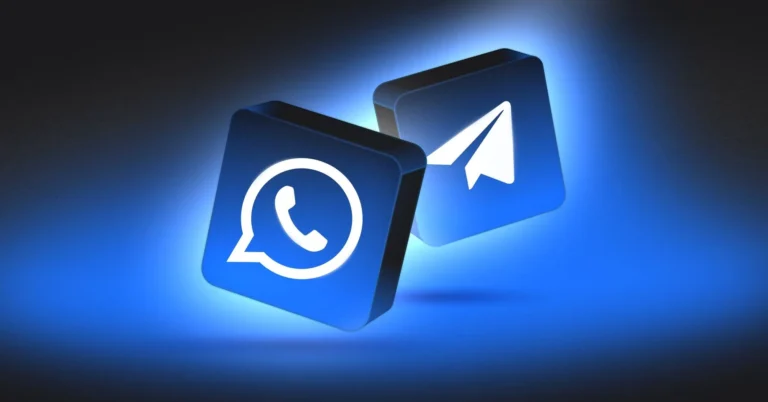For decades now, email has been the go-to method of communication in almost every industry. It’s been the official shake of the hand of a business, the safest way to send documents and the only way of being identified when signing up for something online. But things are changing. There are swift advances in instant messaging platforms, especially those like the WhatsApp Web and the ubiquitous Telegram Download, so are they going to make email obsolete?
There is really no answer to this either. The fact is, we’re seeing a big redefinition going on where communication channels go. Email is not dying, but it’s being redefined as platforms like WhatsApp and Telegram create their own essential niche to fill in that way of thinking about speed, simplicity and seamless collaboration.
The Allure of Instantaneity and Informal Flow
The primary advantage of WhatsApp Web and Telegram lies in their immediacy. Where an email can sit unread in an inbox for hours or even days, a message on these platforms arrives with a noticeable ping. The conversation is synchronous, flowing like a natural discussion. This is invaluable for quick questions, rapid-fire brainstorming, or coordinating urgent tasks within a team. The informal tone reduces the friction of formal salutations and sign-offs, making communication feel more direct and human. For many, initiating a chat via a quick Telegram Download on their phone feels far more natural than drafting a formal email for a simple query.
Seamless Cross-Platform Accessibility
The fact that there’s a blur between mobile and desktop also plays a role here. A service like WhatsApp Web on the other hand lets you continue your message even when you’re offline and never miss a beat—it’s easier for you to avoid the awkward transition of context between devices and for you to get the kind of incendiary experience that you crave when signing in to your phone from your computer. And it also keeps your chat history, files and preferences all at the ready—even on your smartphone or laptop. The same goes for email. Yes you can exchange emails with other people wherever you go and yes you’ll even get the notification when your email gets sent, it’s just it’s still your email and not a real conversation.
The Power of Groups and Channels
There are mailing lists in email, which are not elegant, sometimes not user-friendly and often become spam. Group chat on WhatsApp Web and Telegram has revolutionized community/team communication by rapidly setting up a group for a project, family or club. The ability to share multimedia, to make responses and other actions using emojis and real time notifications fosters a sense of active participation and community unlike an email chain.
The comfort of a Telegram Download can easily direct you to important news sources, interest groups and community notices in a dynamic feed.
Where Email Holds Its Ground: Formality and the Paper Trail
Despite the convenience and fastness of WhatsApp Web and other web services, email is still the preferred method for communicating in certain real-world cases. Documentation needs formal structure and balance, such as job applications, official client proposals and legal documents. An important contract inked via a WhatsApp chat does not require the professionalism and reliability of an email message. Email is also a fantastic digital file-storage mechanism. Because you can easily search for, archive, and retrieve your old correspondence, it is therefore the best option in documenting an objective record. In spite of its quick and effective Telegram Download, it is not the best method for keeping up-to-date important business correspondence that may be refereed in a few years’ time.
The Question of Security and Privacy
Security is, for all intents and purposes, a double edged sword. Telegram is very secure when you use their “Secret Chats”; WhatsApp has end-to-end encryption on default. For that matter, email (especially enterprise-grade mail) has very strong security protocols, compliance features (GDPR/HIPAA, for example) and, in many cases, very sophisticated administrative controls that enterprises need. Even if email is open to everybody (and that’s the benefit of universal communication), you can get caught in the middle of the problem. The choice between a controlled environment of a corporate email server and an encrypted, consumer-oriented platform (Whatsapp Web) often gets me in that same situation (depending on the specific security needs of the communication).
Conclusion
So is WhatsApp Web going to be the next email? Is Telegram Download going to be your go-to email client? The evidence says that, on the whole, you will have to live with this: These instant messaging apps are not going to kill email; they are trying to raise some minor flaws about email in terms of real-time, collaborative, and informal communications. They’ve at least succeeded in offloading some form of communication that email was never meant to do in the first place.
The modern professional or social communicator now has two sets of tools at his disposal, a simple quick check-in on WhatsApp Web, the massive community update on a channel (after all, once you’ve downloaded Telegram, that’s another story) but still all in all, the formal proposal, job offer and legally binding agreement still go straight into the email mailbox. Email has been abolished as the one-stop shop for everything digital – but it has been strengthened in its fundamental importance as the medium for formality, permanence and official recording – and the future is not an ‘one tool for one conversation’.

